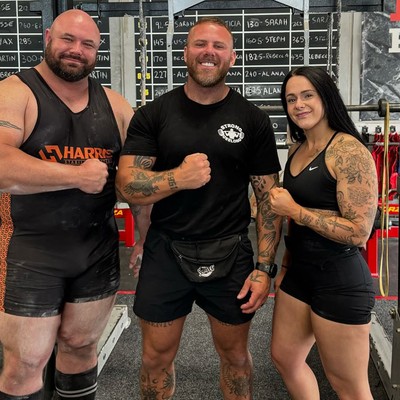Local Coach, Online Coach, Training Squad - Which Is Best for You?

A local coach
This is a coach who is within your locality and who you can physically see and talk to as necessary. They might include regular check ins, personal training sessions and the occasional friendly catch up.
Pros
- You often develop a friendly relationship with your coach, because you see them a lot when you’re tired, having a tough week or a good one.
- For this reason, they can get to know you better and see the effects of training on you instead of only hearing about it. Depending on the sport they are also more available to actually help you with your preparation instead of just talking you through it.
- This method also typically means you only need one professional to help you, not multiple which can ease the confusion of your plan and often make the process overall a bit cheaper.
- A local coach can also make you more accountable as they have more information and are more likely to find out about your lifestyle, recreation, slacking off or missing training sessions.
Cons
- If you have issues with your coach being confined to just one can make breaking away difficult. A distance relationship can mean less guilt if you choose to break ties.
- Depending on whether you’re in training for competitiveness or just for fun, a social relationship with your coach or training squad can get in the way of your overall goal and blur focus.
- Sometimes other methods of distanced information can assist in your training approach and educate you and you are less likely to experience this through one coach as they have single methods (depending on their approach to research and changing methods).
Best suited to
- Someone who is new to a sport and has never trained in the discipline before and needs more one on one help and reassurance.
- Someone who is busy and doesn’t want the headache of working out their own plan.
- Someone who likes the social aspect of training and the face to face contact.
- Someone who may need the extra discipline to not slack off by the inability to hide from missed sessions/cheating on their plan.

An online coach
This is a coach who you may hire online who typically resides in another state or even country. You generally haven’t personally met them and may have discovered them online, through social media or word of mouth due to success.
Pros
- If you just want a program that you know you can follow, is delivered on time and with short points of contact then an online coach is perfect.
- You can typically access more ‘celebrity' or ‘fitness famous’ programs through an online method. These are great if you are time-poor and just want the information delivered so it’s available at a time you can process and complete it.
- This also allows you to have the flexibility of meeting your own time schedule to make your training work around your needs.
Cons
- Often with online coaches, you are not dealing with the ‘named celebrity’ themselves (if that’s what you’re after). They have staff because they have so many clients, so your plans can be a little less personal. If you have a personal one-on-one coach, that’s great!
- The distance can mean they don’t see your physical and emotional reaction to stress unless you tell them (which many of us don’t) so that can be hard.
- If you’re someone who isn’t totally disciplined when it comes to hitting up your sessions, an online program with no one there to watch you and make you accountable can be a bad combination (apps like My Fitness Pal and Strava can help with accountability!).
- If your trainer is in another time zone, even if you have access to call and discuss with them at any time, chances are they may be asleep and not actually available when you’re in the middle of your 6 am session, so communication can be less consistent.
Best suited to
- Someone who has trained before and just needs a training program, and less hand-holding through the process (they know what to do and how they will expect to feel).
- Someone who is time-poor and just wants to get a session done in their own time, without the structure of training groups and PT bookings.
- Someone who is honest with their sessions and won’t slack off.

Training squads
These are a group of people typically all training for the same event with frequent group sessions. They’re very popular in more aerobic-based sports like running, swimming, riding, triathlons etc.
Pros
- Training squads can be full of support and knowledge from a number of people who have already done an event. Typically there will still be a coach or head trainer, who might even be doing it with you.
- These often involve plenty of social events post-training like coffees and brunches, so friendships are commonly built. These are great as you’re surrounded by like-minded people who keep your focus on track and your fire burning for your main event.
Cons
- Not everyone will have the same speed. A training squad that sticks together might slow you down or be too fast for you.
- Training sessions will take longer than individual sessions. This doesn’t refer to the training itself, but there will always be socializing on either side which will add 10-40 minutes to your total time. Therefore these aren’t suited to busy people.
- You may also not get along with everyone in your training group, that just happens!
- Post-event, the squad may stick together or break apart, this will mean you have to learn the training on your own again.
- Everyone will have their own opinion on training, so if someone isn’t taking charge, there can be a lot of voices.
Best suited to
- Someone who can block out the noise and still get a session done in a group.
- Someone who has a little more time on their hands for socializing and loves networking with like-minded people.
- Someone who is not necessarily in it to win, but more to make personal achievements.

Train yourself/research
This refers to designing your own approach to training through research online, people you know and your own knowledge from experience.
Pros
- You can design your own schedule, to suit your time frame, priorities and needs. You know your weaknesses and strengths best and can train to accommodate them.
- You don’t have any distraction from other people’s opinions, having to relay information to anyone or have hold-ups of waiting for plan updates and check-ins.
- Your plan is constantly flexible to your needs.
Cons
- It can be easy to lose focus if life gets in the way (ie a big project at work) as you don’t have to ‘think’ about anything else.
- You have created more work for yourself needing time to research and plan.
- It can be easier to say ‘no’ to yourself. It can be easier to avoid the harder sessions because you know they will hurt.
- Researching can be difficult with a huge amount of contradicting data available online.
Best suited to
- Someone who has a number of the same events under their belt, so they know what’s necessary to reach their goal.
- Someone who is completely focused on their goal and won’t let things ‘get too hard’ as an excuse to stop.
- Someone who has a good base knowledge of sport, fitness and their discipline.

The verdict
So, whatever plan or combination you choose, all training approaches have their pros, cons and people they are best suited to.
It certainly pays to try one, all or a combination to see which you prefer. For me, the biggest component is probably about what keeps my motivation strong. If your motivation is strong then the rest is easy and not a chore. You will want to achieve!
Happy training!

Formerly working as part of Bulk Nutrients R&D team for many years, Nicole Frain is a food scientist, personal trainer and a professional international cyclist.
She's applied her learnings at the national stage for bodybuilding, and has several qualifications in Food Science, Nutrition and Business!
More about Nicole Frain






























